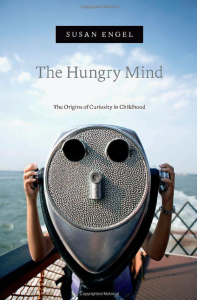 How might we encourage more curiosity among young people and particularly among those with lower levels of curiosity? How might we make their minds intellectually hungry? Susan Engel, a senior lecturer in psychology and the director of the program in teaching at Williams College, tackles these questions in her new book, The Hungry Mind: The Origins of Curiosity in Childhood. She reports that curiosity, the urge to understand that which is uncertain or unexpected and the mother of intellectual achievement and learning, wanes over childhood and can be squelched in school even when teachers report a commitment to fostering curiosity. She outlines curiosity’s development across childhood and shares techniques that parents, teachers, and students can use to foster curiosity. Her personal stories of life as a curious person make this informative book also engaging and relatable to a wide audience.
How might we encourage more curiosity among young people and particularly among those with lower levels of curiosity? How might we make their minds intellectually hungry? Susan Engel, a senior lecturer in psychology and the director of the program in teaching at Williams College, tackles these questions in her new book, The Hungry Mind: The Origins of Curiosity in Childhood. She reports that curiosity, the urge to understand that which is uncertain or unexpected and the mother of intellectual achievement and learning, wanes over childhood and can be squelched in school even when teachers report a commitment to fostering curiosity. She outlines curiosity’s development across childhood and shares techniques that parents, teachers, and students can use to foster curiosity. Her personal stories of life as a curious person make this informative book also engaging and relatable to a wide audience.
Engel lauds curiosity because kids who are habitually curious learn more and when a child is momentarily curious, her learning is optimized at that time. She notes, however, that curiosity is stifled because schools often treat it as a distraction from “real learning.” Early in her career Engel realized that teachers care about cultivating curiosity even though they often fall short of doing so. An accurate measure of curiosity might help teachers foster curiosity and give them the incentive to do so amidst competing demands. However, creating a measure of curiosity has proved elusive because curiosity can vary so greatly within and between individuals as well as between cultures.
Curiosities are often brief and transitory, but the perseverance to find answers to questions that pique curiosity is important. The likelihood and appropriateness of engaging with transitory versus prolonged curiosities changes as people get older. To babies so much in their world is novel, and they have a strong preference for attending to this novelty. Toddlers point and ask numerous questions to understand physical, biological and cultural processes in the world around them. Older children’s interests tend to be more specific, refined and long-lasting.
The extent to which a child is curious about her world is strongly predicted by the curiosity her parents, and later on her teachers and other caring adults, exhibit. Children are likely to seek explanations for unexpected events when they see adults do the same and when they trust that adults will provide opportunities to explore. Novelty-seeking behavior in toddlers and question-asking in older children is tempered by fear; babies who are securely attached to a parent and children in a warm classroom environment (i.e. kids who are not fearful) are likely to explore and inquire.
Engel discusses the importance of difficulty, periods of uncertainty, gossip, reading and down-time for satisfying curiosity and promoting learning. When students struggle to learn a new concept initially, they ultimately learn it more robustly. As such, creating uncertainties by introducing interesting intricacies of a problem can lead to better retention of information and a positive cycle of more learning. Teachers can help students appreciate that temporarily not knowing something can feel exciting, and satisfying a curiosity can be pleasurable.
Peer interactions help satisfy curiosities. Gossip about peers is perhaps our most intense, inherent, and universal curiosity. Children are easily and deeply enchanted by storytelling. Stories about peers’ circumstances and personal attributes can serve as a social glue and a way of learning cultural values. Although curiosity about people around us is robust, there are age, gender, and cultural differences in type and amount of gossiping. There are also cultural differences in language use, question asking, and story telling that can impact curiosity. For example, cultures with more formal education are also the cultures that encourage more question asking.
Engel argues that reading is an invaluable way to satisfy one’s curiosities, and many answers to the questions that interest children can be found in books or on the internet. Furthermore, students’ alone-time to explore their individual curiosities independently and to reflect outside of school helps them become more academically successful and intellectually engaged as life-long learners. Opportunities for down-time are declining. Most hours of a student’s day are scheduled, and teachers struggle to allow children to explore very much at school because exploration can lead to time consuming false starts. Engel provides us a much needed window into the fact that nurturing curiosity involves false starts. Pursuing curiosities requires time, stimulating materials to explore, and people who model curiosity. As we shift to provide students with these ingredients we may be able to keep more minds hungry into adulthood and provide them with tools to feed that hunger.
Engel, S. (2015). The Hungry Mind: The Origins of Curiosity in Childhood. Cambridge, MA: Harvard University Press.




